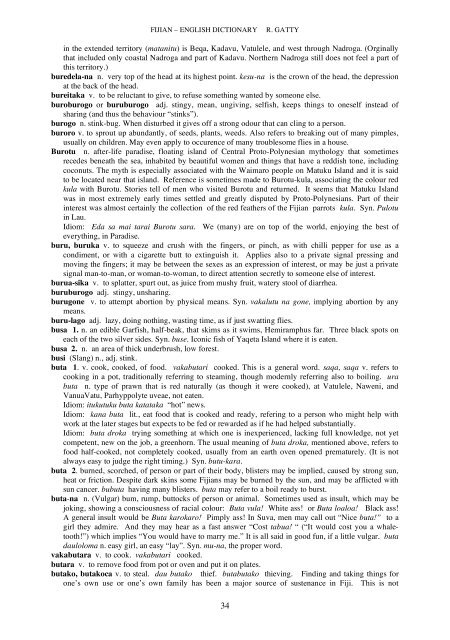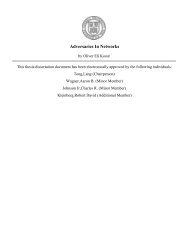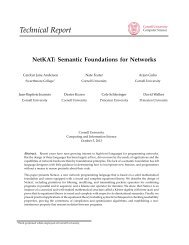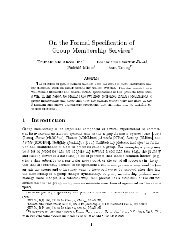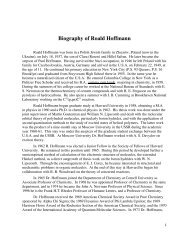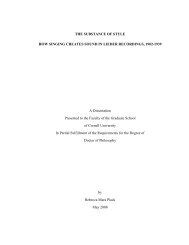Fijian-English Dictionary - eCommons@Cornell - Cornell University
Fijian-English Dictionary - eCommons@Cornell - Cornell University
Fijian-English Dictionary - eCommons@Cornell - Cornell University
Create successful ePaper yourself
Turn your PDF publications into a flip-book with our unique Google optimized e-Paper software.
FIJIAN – ENGLISH DICTIONARY R. GATTY<br />
in the extended territory (matanitu) is Beqa, Kadavu, Vatulele, and west through Nadroga. (Orginally<br />
that included only coastal Nadroga and part of Kadavu. Northern Nadroga still does not feel a part of<br />
this territory.)<br />
buredela-na n. very top of the head at its highest point. kesu-na is the crown of the head, the depression<br />
at the back of the head.<br />
bureitaka v. to be reluctant to give, to refuse something wanted by someone else.<br />
buroburogo or buruburogo adj. stingy, mean, ungiving, selfish, keeps things to oneself instead of<br />
sharing (and thus the behaviour “stinks”).<br />
burogo n. stink-bug. When disturbed it gives off a strong odour that can cling to a person.<br />
buroro v. to sprout up abundantly, of seeds, plants, weeds. Also refers to breaking out of many pimples,<br />
usually on children. May even apply to occurence of many troublesome flies in a house.<br />
Burotu n. after-life paradise, floating island of Central Proto-Polynesian mythology that sometimes<br />
recedes beneath the sea, inhabited by beautiful women and things that have a reddish tone, including<br />
coconuts. The myth is especially associated with the Waimaro people on Matuku Island and it is said<br />
to be located near that island. Reference is sometimes made to Burotu-kula, associating the colour red<br />
kula with Burotu. Stories tell of men who visited Burotu and returned. It seems that Matuku Island<br />
was in most extremely early times settled and greatly disputed by Proto-Polynesians. Part of their<br />
interest was almost certainly the collection of the red feathers of the <strong>Fijian</strong> parrots kula. Syn. Pulotu<br />
in Lau.<br />
Idiom: Eda sa mai tarai Burotu sara. We (many) are on top of the world, enjoying the best of<br />
everything, in Paradise.<br />
buru, buruka v. to squeeze and crush with the fingers, or pinch, as with chilli pepper for use as a<br />
condiment, or with a cigarette butt to extinguish it. Applies also to a private signal pressing and<br />
moving the fingers; it may be between the sexes as an expression of interest, or may be just a private<br />
signal man-to-man, or woman-to-woman, to direct attention secretly to someone else of interest.<br />
burua-sika v. to splatter, spurt out, as juice from mushy fruit, watery stool of diarrhea.<br />
buruburogo adj. stingy, unsharing.<br />
burugone v. to attempt abortion by physical means. Syn. vakalutu na gone, implying abortion by any<br />
means.<br />
buru-lago adj. lazy, doing nothing, wasting time, as if just swatting flies.<br />
busa 1. n. an edible Garfish, half-beak, that skims as it swims, Hemiramphus far. Three black spots on<br />
each of the two silver sides. Syn. buse. Iconic fish of Yaqeta Island where it is eaten.<br />
busa 2. n. an area of thick underbrush, low forest.<br />
busi (Slang) n., adj. stink.<br />
buta 1. v. cook, cooked, of food. vakabutari cooked. This is a general word. saqa, saqa v. refers to<br />
cooking in a pot, traditionally referring to steaming, though modernly referring also to boiling. ura<br />
buta n. type of prawn that is red naturally (as though it were cooked), at Vatulele, Naweni, and<br />
VanuaVatu, Parhyppolyte uveae, not eaten.<br />
Idiom: itukutuku buta katataka “hot” news.<br />
Idiom: kana buta lit., eat food that is cooked and ready, refering to a person who might help with<br />
work at the later stages but expects to be fed or rewarded as if he had helped substantially.<br />
Idiom: buta droka trying something at which one is inexperienced, lacking full knowledge, not yet<br />
competent, new on the job, a greenhorn. The usual meaning of buta droka, mentioned above, refers to<br />
food half-cooked, not completely cooked, usually from an earth oven opened prematurely. (It is not<br />
always easy to judge the right timing.) Syn. butu-kara.<br />
buta 2. burned, scorched, of person or part of their body, blisters may be implied, caused by strong sun,<br />
heat or friction. Despite dark skins some <strong>Fijian</strong>s may be burned by the sun, and may be afflicted with<br />
sun cancer. bubuta having many blisters. buta may refer to a boil ready to burst.<br />
buta-na n. (Vulgar) bum, rump, buttocks of person or animal. Sometimes used as insult, which may be<br />
joking, showing a consciousness of racial colour: Buta vula! White ass! or Buta loaloa! Black ass!<br />
A general insult would be Buta karokaro! Pimply ass! In Suva, men may call out “Nice buta!” to a<br />
girl they admire. And they may hear as a fast answer “Cost tabua! “ (“It would cost you a whaletooth!”)<br />
which implies “You would have to marry me.” It is all said in good fun, if a little vulgar. buta<br />
dauloloma n. easy girl, an easy “lay”. Syn. mu-na, the proper word.<br />
vakabutara v. to cook. vakabutari cooked.<br />
butara v. to remove food from pot or oven and put it on plates.<br />
butako, butakoca v. to steal. dau butako thief. butabutako thieving. Finding and taking things for<br />
one’s own use or one’s own family has been a major source of sustenance in Fiji. This is not<br />
34


